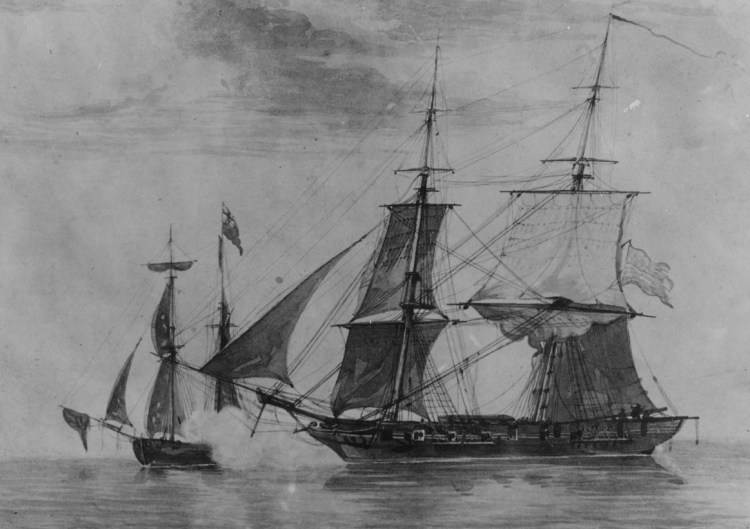Sept. 5, 1813: In a War of 1812 encounter, the U.S. brigantine Enterprise intercepts the British brigantine Boxer as it chases and fires upon a merchant ship heading to port in Bath. Capt. Samuel Blyth, 29, the British commander, was trying to disrupt commerce along the New England coast, especially in Maine.

After a morning of drifting near Monhegan Island with no wind and being too far apart for battle, the two ships move closer to one another when the wind picks up in the afternoon.
In a fierce, closely fought engagement, the ships blast each other with cannon fire for a half-hour. The Enterprise’s first volley kills Blyth immediately. Moments later, Lt. William Burrows, also 29, in charge of the Enterprise, is struck mortally in the thigh. He survives long enough to accept the sword of Boxer’s replacement in surrender, then is taken below deck and dies eight hours later.
The victorious Enterprise arrives two days later in Portland with the Boxer in tow. The captains are buried together in the city’s Eastern Cemetery.

Detail of a postcard celebrating the signing of the Portsmouth Treaty. Image courtesy of the Library of Congress
Sept. 5, 1905: Russia and Japan, after weeks of talks at the Portsmouth Naval Shipyard in Kittery, sign the Treaty of Portsmouth, ending the 1904-05 Russo-Japanese War.
The war resulted from the two empires’ competing ambitions to carve out spheres of influence in Manchuria and Korea. When negotiations failed, Japan struck the Russian Eastern Fleet in a surprise attack in Port Arthur, China.
The 1905 peace talks bogged down when Japan demanded that Russia pay reparations. It the end, Russia agrees to pay nothing and the two nations divide Sakhalin Island.
President Theodore Roosevelt’s remote but personal management of the negotiations wins him the Nobel Peace Prize and accolades from other world leaders.
Sept. 5, 1960: Maine Central Railroad Co., which had been in business since 1862, operates its last passenger train.
The end of the service essentially deprives the state of passenger trains until the Amtrak Downeaster debuts in 2001.
Maine Central remains in business as a company until its sale in 1981 to Guilford Transportation Industries.
Joseph Owen is an author, retired newspaper editor and board member of the Kennebec Historical Society. Owen’s book, “This Day in Maine,” can be ordered at islandportpress.com. To get a signed copy use promo code signedbyjoe at checkout. Joe can be contacted at: jowen@mainetoday.com.
Comments are not available on this story.
Send questions/comments to the editors.


